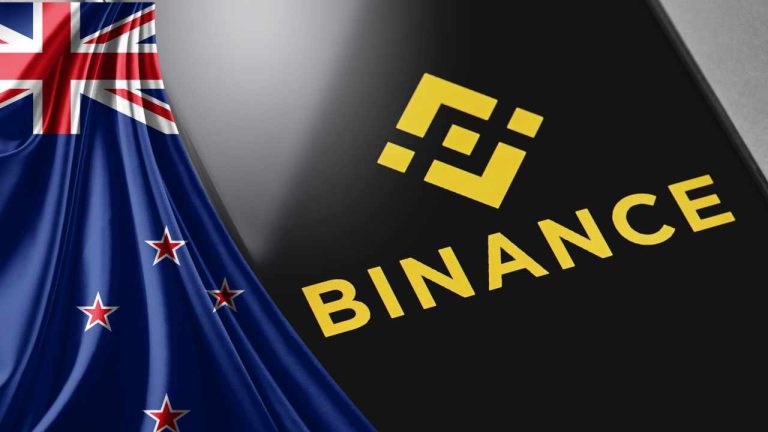
Initially owing creditors $4.2 million, Cryptopia’s liquidator Grant Thornton has distributed at least $225 million in crypto to hack victims in December.
Liquidators of the bankrupt cryptocurrency exchange Cryptopia have started distributing millions to users affected by a hack that took place almost six years ago.
Cryptopia’s liquidating firm, Grant Thornton, on Dec. 20 announced the start of distributions to more than 10,000 verified account holders affected by Cryptopia’s hack in 2019.
Over the past two days, verified account holders of Bitcoin (BTC) and Dogecoin (DOGE) received crypto distributions worth at least 400 million New Zealand dollars ($225 million), the liquidator said.

New Zealand's central bank has taken a four-stage approach to CBDC issuance and aims to issue an in-house digital dollar by 2023.
The Reserve Bank of New Zealand (RBNZ) opened a 101-day public consultation on the principles and design options it created for the nation’s digital dollar. However, the central bank plans to discuss the issuance of a central bank digital currency (CBDC) in future consultations.
RBNZ has taken a four-stage approach to CBDC issuance and aims to issue an in-house digital dollar by 2023. New Zealand’s central bank is in the second stage of its digital cash initiative, which involves exploring high-level design options for digital cash and related consulting and budgeting.
On April 17, the central bank released a consultation paper to help determine “future work on whether digital cash is right for New Zealand.” The consultation closes on July 26.

Easy Crypto launched the aptly named New Zealand Dollar Stablecoin (NZDD) in partnership with an Australian blockchain development firm.
A New Zealand dollar-pegged stablecoin has gone live through a partnership with New Zealand crypto exchange Easy Crypto and Australian blockchain development firm Labrys.
In a Nov. 22 announcement, Labrys and Easy Crypto said the NZDD will be backed 1:1 with cash in trust and regulated by the New Zealand Financial Markets Authority.
It’s initially live on Ethereum but has plans to expand to Polygon, the BNB Smart Chain, Arbitrum, Optimism and Coinbase’s Base.
Easy Crypto was motivated to launch the stablecoin as it claimed it was harder for New Zealanders to maximize their profits when using U.S. dollar-pegged tokens.
Easy Crypto co-founder and CEO Janine Grainger said the NZDD bridges the gap with traditional finance and claimed it would “move NZ forward as a nation, giving us a digital, programmable currency that can do everything the NZD can do.”
Related: Binance launches New Zealand-based offices following regulatory approval
Alongside the stablecoin, Easy Crypto introduced a multicurrency self-custody wallet protected by multiparty computation cryptography by enlisting the user’s “trusted social circle” with parts of the key instead of a seed phrase.
Keep an eye out for an upcoming episode with Easy Crypto talking about the new wallet and new #stablecoin!
— Darcy Ungaro (@UngaroDarcy) November 21, 2023
#NZDD #investing #alternative #assets #realdiversification pic.twitter.com/Wt9EPq1Gri
An August report commissioned by the New Zealand’s parliament said the country has taken an “agile” approach to crypto regulation. It recommend that problems are "addressed as they arise and that the government creates "coherent and consistent guidance on the treatment of digital assets under current law.”
Earlier attempts to launch a NZ dollar-pegged stablecoin include the 2021 launch of $NZDs by Australian financial services provider Techemyny.
However, in 2022, the bridge used by the stablecoin was blacklisted after the hack of the DFX Finance protocol in November 2022 leaving a large portion of funds stranded on the Polygon blockchain.
Magazine: Unstablecoins: Depegging, bank runs and other risks loom

Customers of Auckland-headquartered crypto exchange have been denied access to their funds.
Customers of Auckland, New Zealand-headquartered crypto exchange Dasset have been denied access to their funds, and the company’s representative has revealed the beginning of its liquidation.
On Aug.14, local media outlet The Herald reported on the exchange’s troubles. According to the report, some customers have unsuccessfully tried to withdraw their funds for months.
Speaking to journalists, the company’s CEO, Stephen Macaskill, explained that Dasset didn’t find a banking provider after its previous provider stopped working with the exchange in January 2023. Macaskill also revealed that the company had launched voluntary liquidation. However, it is still possible to open a new account on Dasset, and no news about liquidation appeared on the company’s official X (formerly Twitter or Instagram accounts.
Related: Binance launches New Zealand-based offices following regulatory approval
The link to Dasset’s official website now leads to the page of law firm Grant Thornton’s announcement about the liquidation of the exchange. The company was appointed as liquidator:
“Dasset’s management says a significant reduction in asset values and trading levels impacted its ability to trade profitably. It was determined the appointment of liquidators was in the best interests of all stakeholders.”
Grant Thornton intends to contact all customers and suppliers in the next few days and promises to keep the focus on “securing and protecting” Dasset’s assets.
In June 2023, Ian Woolford, the Reserve Bank of New Zealand’s director of money and cash, publicly stated that the country still doesn’t need a regulatory approach to crypto. Current legislations consider digital assets a form of property and regulate it through non-crypto-specific financial, money laundering and tax guidelines.
Magazine: Deposit risk. What do crypto exchanges really do with your money?

Reserve Bank of New Zealand however said that crypto and stablecoins should be more closely monitored.
The New Zealand central bank is ramping up its monitoring of stablecoins and crypto-assets following public submissions, but has stopped short of calling for a “regulatory approach.”
Ian Woolford, the Reserve Bank of New Zealand’s director of money and cash, said in a June 30 statement that the RBNZ agrees that “a regulatory approach isn’t needed right now, but increased vigilance is.”
Accompanying Woolford’s statement was a summary of 50 stakeholder submissions to an earlier RBNZ paper discussing crypto and decentralized finance.
New forms of money such as crypto and stablecoins create opportunities and risks for New Zealanders and the financial system. Have your say now on these and how we should respond: https://t.co/RE9j0ryjVk#rbnz pic.twitter.com/yvcR2tjd9y
— Reserve Bank of NZ (@ReserveBankofNZ) February 10, 2023
Respondents included the country’s crypto advocacy body BlockchainNZ, tech company Ripple, along with banks such as Westpac and the Bank of New Zealand.
Woolford said the submissions showed crypto had “significant risks and opportunities” along with “uncertainties” about the sector’s development which gave it the need for extra attention:
“We agree that caution is needed, which also reinforces the need for enhanced data and monitoring to build understanding.”
The RBNZ is seemingly waiting to see how other jurisdictions will regulate crypto before it makes its own moves.
“Global harmonization is crucial to ensure effective regulation,” Woolford said. He added best practices may become clearer “as overseas regimes are implemented.”
Related: Unfazed by SEC tumult, top banks work to make blockchains interoperable
A Chainalysis report in 2022 ranked New Zealand 108 out of 146 in its 2022 Global Crypto Adoption Index, just behind Austria and in front of Azerbaijan.
New Zealand’s current laws consider crypto a form of property. Digital assets are governed by various non-crypto-specific financial, money laundering and tax regulations that generally apply.
“Issues raised by cryptoassets and other innovations do not fall neatly within agency boundaries," Woolford said.
He added that consumer and investor protections, along with regulatory barriers to entry, do matter if the country wants to create a “reliable and efficient money and payment system.”
Magazine: Unstablecoins: Depegging, bank runs and other risks loom
 Interest in the U.S. banking crisis has risen greatly over the past two weeks, as shown by Google Trends data. There has been a sharp increase in queries related to search terms such as “banking crisis,” “bank collapse,” and “bank failure.” On March 13, 2023, the search term “banking crisis” reached the top Google Trends […]
Interest in the U.S. banking crisis has risen greatly over the past two weeks, as shown by Google Trends data. There has been a sharp increase in queries related to search terms such as “banking crisis,” “bank collapse,” and “bank failure.” On March 13, 2023, the search term “banking crisis” reached the top Google Trends […] Binance has officially launched a cryptocurrency exchange in New Zealand after successfully registering with the country’s financial regulator. “We see significant value in having a serious New Zealand presence,” said Binance CEO Changpeng Zhao (CZ). Binance Launches Crypto Trading Platform in New Zealand Global crypto exchange Binance announced Friday that it has successfully registered as […]
Binance has officially launched a cryptocurrency exchange in New Zealand after successfully registering with the country’s financial regulator. “We see significant value in having a serious New Zealand presence,” said Binance CEO Changpeng Zhao (CZ). Binance Launches Crypto Trading Platform in New Zealand Global crypto exchange Binance announced Friday that it has successfully registered as […]
New Zealand lawmakers and regulators largely have not imposed strict guidelines for crypto firms to operate in the country, nor for Kiwis to use cryptocurrencies freely.
Global cryptocurrency exchange Binance has registered with New Zealand’s Ministry of Business, Innovation and Employment and opened local offices in the country.
In a Sept. 29 tweet, Binance said it was registered as a financial service provider in New Zealand, allowing residents to access services including spot trading, nonfungible tokens and staking. The move to the crypto-friendly Pacific nation followed regulators in Dubai, Abu Dhabi, Kazakhstan and Italy giving the green light for Binance to open an offshoot.
“New Zealand is an exciting market with a strong history of fintech innovation,” said Binance CEO Changpeng Zhao.
New Zealand! We are kiwis. https://t.co/UtxbVlvXFV
— CZ Binance (@cz_binance) September 30, 2022
New Zealand lawmakers and regulators have largely not imposed strict guidelines for crypto firms to operate in the country, nor for Kiwis to use cryptocurrencies freely. The country’s tax authority said in 2019 that income from crypto was legal, and the Reserve Bank of New Zealand has been exploring the potential benefits and risks of a central bank digital currency.
In June, Huobi Global secured registration as a registered financial service provider in New Zealand but later suspended its derivatives trading services for residents, citing compliance with local regulations. With a population of roughly 5.1 million, New Zealand is a smaller market compared with that of its neighbor Australia, where a reported 4.2 million people own crypto.
Related: Aussie banks ANZ and NAB won’t ‘endorse’ retail speculation on crypto
Though expanding to many countries around the globe, Binance has still been the target of some regulators. In July, the Netherlands’ central bank fined Binance Holdings $3.3 million for offering crypto services without registering. The firm also formed a task force called the Global Advisory Board on Sept. 22 aimed at tackling regulatory issues related to crypto, blockchain and Web3 adoption.

Huobi Global claims compliance with local regulations as its reason for excluding New Zealand from its list of countries in which it operates derivatives trading.
Crypto exchange Huobi Global announced the suspension of derivatives trading in New Zealand. The statement from Huobi said the new restrictions against derivative offers are in light of compliance with local regulations.
Users in New Zealand will no longer have access to derivative trading services, which include coin-margined futures and swaps, USDT-margined contracts, options and exchange-traded products (ETPs).
The new restrictions will take effect on Aug. 23, 2022. On the same day, Huobi Global will no longer accept users with New Zealand Know Your Customer (KYC), along with IP addresses from the area. Users wishing to close out active positions can do so only on and after the effective date of the restrictions.
Cointelegraph reached out to Huobi Global for a comment on the development.
Huobi has a growing list of restricted countries, including 11 jurisdictions unable to access any of its services. Locations such as the United States, Canada and Japan fall into this category. At the same time, places like mainland China, Taiwan and the United Kingdom are unable to access derivative trading.
Related: Uzbekistan blocks access to foreign crypto exchanges over unregistered trading
This comes shortly after reports of Huobi co-founder Leon Li wanting to sell a majority stake in the company. The stake has a value of over $1 billion. Founded in 2013, Huobi Global handles more than $1 billion in volume of daily trades.
Despite this development in New Zealand, the company has recently made moves toward expanding its offerings in other regions. In early August, Huobi received the green light from Australian regulators, a neighboring country of New Zealand, to be an exchange provider.
In the United States, Huobi secured its FinCEN license this past July. A subsidiary of the company called HBIT received its Money Services Business (MSB) license from the United States Financial Crimes Enforcement Network (FinCEN).
All these developments come as Huobi launched a $1 billion investment initiative with a focus on decentralized finance (DeFi) and Web3 expansion.
 During the past seven days, non-fungible token (NFT) sales have dropped 23.37% and 30-day statistics show NFT sales are down 63.10% from the month prior. While NFT interest has been waning, a recent study indicates that global regions like Singapore and Hong Kong lead the pack in terms of NFT interest. The research further suggests […]
During the past seven days, non-fungible token (NFT) sales have dropped 23.37% and 30-day statistics show NFT sales are down 63.10% from the month prior. While NFT interest has been waning, a recent study indicates that global regions like Singapore and Hong Kong lead the pack in terms of NFT interest. The research further suggests […]